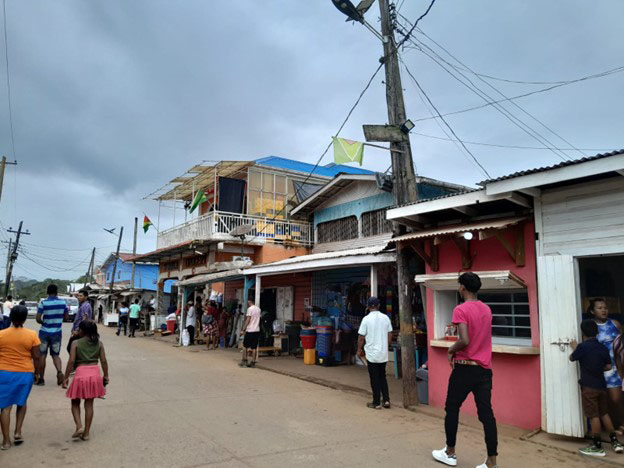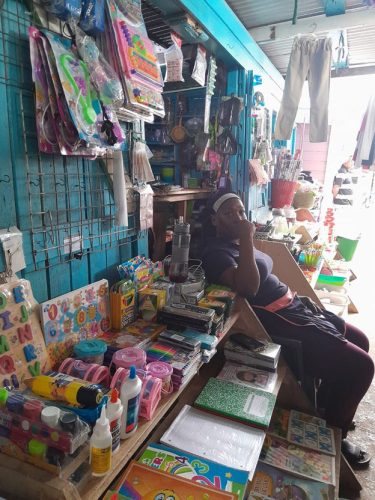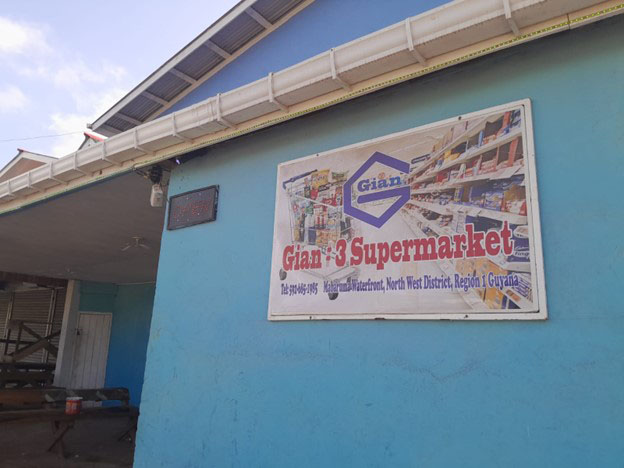By Nazima Raghubir
Nancy McKenzie reaches for a pack of exercise books, her customer is a teenager shopping for school supplies, “this is what I live on,” she quips, “I came here to make a living.”
McKenzie operates a small shop on the Kumaka Waterfront in Mabaruma, Region One. The mother of two inherited the shop from her mother who started that business in the 1990s. But McKenzie is worried about the threat to her business particularly from supermarkets owned by Chinese nationals. There are now two supermarkets owned and operated by Chinese nationals in Mabaruma. These sell groceries including food and beverages, clothing as well as stationery, “the only thing the Chinese are not selling is the creole food,” McKenzie said as she lamented the “threat” to her and other business operators, “these supermarkets are selling everything cheaper, they have their own boats doing transportation, their own porters,” she said, “it is different for us, we have to pay for transportation and that affects our prices.”
Evelyn Melville who operates a small store selling school uniforms, stationery, cloth and other supplies in Kumaka explained that the issue was raised with the government. She explained that one government official’s response was that there was little the government could do but encouraged businesses to be “versatile”.

“I believe that our community is pretty small and there would be much more competition with them being here,” Melville said.
Opposition Member of Parliament Ronald Cox who resides in Region One said that business owners continue to raise the issue with him. Last year, several operators who were preparing to form a business chamber for the region, listed many concerns.
“They felt that these businesses were not legitimate, in the sense that GRA may not be collecting taxes,” he said, “We encourage investors, we encourage competition, as long as everything is in order, as long as they comply with regulations and policy and all of that,” the MP declared.
When this reporter reached out to the supermarkets for comments, no one would speak. Among the common reactions was that none of the people we approached could speak English. Additionally, none of the establishments we visited were prepared to provide receipts for the items this reporter purchased. Among those items were water, canned foods and confectionery.

Meanwhile, MP Cox said among the other concerns are that these supermarkets are retailing items much cheaper. He said this is obvious as more people may flock to buy cheaper items over the ones retailed by vendors who have to use the ferry and bear the transportation costs which are then reflected in their prices. “I am not against the establishment of businesses,” Cox said, “but if you are constructing a building, local people must be employed, when you are finished construction, our local people must be employed in the supermarket,” he contended.
In an invited comment, Regional Chairman Brentnol Ashley said that he has heard concerns from the business community in Mabaruma, “I told the persons who reached out to me that they have to find ways to come together, one of the thing is to establish a chamber of commerce,” he said, “which will be able to give them better representation towards their businesses”. Ashley is encouraging the local businesses to be more competitive, “they have to be able to partner with each other to bring that competition that the Chinese supermarkets now offer to the community.”
Ashley said that the foreign nationals have been not been given any special privileges by the Region adding that “other persons have the same level playing field in the region”.
He said: “what we do is try to encourage them to follow the laws as it relates to business registration, as it relates to environment laws etc and the town council has a more direct responsibility for them since these supermarkets and business hubs fall within the confines of the town council”.
Many of the businesses that operated in this Region One community depend on the state operated ferry to transport goods from the city to the border community. A few also rely on air transport but labeled that as a more expensive but a last resort for businesses in the area. “What I see the Chinese do, they try to bring their goods in bulk and they normally use the privately owned ferry to do so,” Ashley explained.
Some Region One residents are in support of the supermarkets, Simon (one name given) picked up a list of items as he prepared to take his fishing vessel to sea, “yuh see all ah dis, is a setta money if I go by the market,” he declare, “now dem Chinese set up here, I can buy rope, drinks and food, cheap, cheap,” the man said. Lorna, a housewife said she shops at these supermarkets and at the vendors, “some things I could never get here, like good fresh fish,” the woman explained, “but you see when the money dipping and I gotta stretch it, is right hay (pointing to the supermarket), I coming.”
Non-naturalised
In April this year, a group of over 60 business owners across the country wrote to President Irfaan Ali complaining about the proliferation of non-naturalised Chinese-owned businesses that engage in unfair competition and their seeming lack of regulatory certificates and licences.
“We are a consortium of Guyanese business owners and concerned citizens, comprising of about sixty-five (65) entities and individuals. We wish to express our serious apprehensions regarding the proliferation of non-naturalized Chinese owned businesses, predominantly supermarkets and hardware stores, throughout communities in Guyana,” stated the letter dated April 22, 2024 and signed by 49 business owners.
The letter was forwarded by President Ali to the Guyana Revenue Authority (GRA) for examination of the issues raised. GRA Commissioner-General, Godfrey Statia has confirmed that the letter was forwarded to him and that the GRA was investigating.






